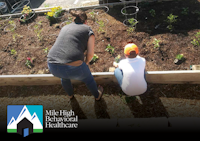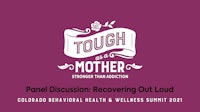
A true labor of love. Connecting moms to a vital and unique support system.
An Interview with Michelle Deuto, Recovery Nurse Advocate at SCL Health, Lutheran Medical Center
In 2016, SCL Health in Denver looked at statistics for their Medicaid population and saw an increased number of babies being admitted into the NICU. So, they got a small systems grant to start a program working with pregnant women who were dealing with substance use disorders. At that time, Michelle Deuto was in her 17th year of being a labor and delivery nurse and felt that the position of Recovery Nurse Advocate for this new program was a perfect fit for her nursing and mental health background.
This Recovery Nurse Advocate program was created to follow moms during pregnancy and for a year postpartum, with the only criteria being that they have a substance use disorder or a history of it. The program is free and provides home visitation care by a Registered Nurse. Additionally, the program offers free doula services – a non-medically trained birth coach trained to educate moms about their pregnancy, the labor process and answer postpartum questions. This support is invaluable to our moms because it provides one-on-one care until delivery – a critical and important time especially if navigating substance use disorder, medically assisted withdrawal treatment or managing recovery.
Michelle explained that they work to connect moms to everything from substance use and mental health treatment to transportation, childcare or stable housing, and accessing WIC or SNAP for nutritional assistance. It also offers education about pregnancy, labor, breastfeeding, and child development. In addition, a support group meets once a week at Lutheran Hospital and a Circle of Parents support group provides a confidential and supportive environment for parents, by parents.
Since starting in the spring of 2017, the program has grown and continued to be funded, now engaging actively with approximately 25 women at a time. They get referrals through West Pines detox, Jefferson County Probation Female Offenders Program and women who deliver at Lutheran Hospital and screen positive for substance use.
Because the greatest risk of relapse is at 7 to 12 months, connecting the moms they work with to support services and setting goals is crucial. “We also reassure them that our door is always open,” Michelle said. “We tell them that the single most important thing they can do for themselves and their baby is to get prenatal care and we assure them that even if they’re still using, there is help available. But typically, these women have friends that have a bad story or they have kids that have been taken away and so we are fighting the stigma and the myths.”
Connecting to help also means helping reduce barriers that make it hard for women to come for treatment. “We're flexible around their schedules, try to tailor our visits to what will keep them engaged and will meet them anywhere from coffee shops to their doctor’s office.” Michelle said. She said that moms need help in a variety of areas from housing assistance to figuring out how to go back to work and balancing all these things is what they often really struggle with. She added that respite care is also needed as moms who are at risk for relapse need to have a safe caregiver who can take care of their baby, even for short periods of time, when needed.
Michelle said they make sure to stay connected to these moms for whatever the future holds. “We tell our moms that even if they are sober the next time they get pregnant, if they need our support and want to work with us again they can. They always have our number and we stay connected via our Circle of Parents groups. They aren’t required to come to these, and the groups are open to the community, but moms do come back to those and stay connected that way. I just had an experience with a mom who participated in our program and recently reunited with us. I attended her baby’s first birthday, and that felt incredible.”
Moms are tough and they can succeed. Reconnecting to their community, collaboration with all the services available to them, and continuous support through support programs are the life-changing connections that make all the difference.
We asked Michelle what she believe providers should know, and how more collaboration could benefit these moms:
- List for all other components of provider collaboration that need to be at play.
- Standardized screening across hospital sites and OB private practices.
- Having social workers who are employed by OB practices.
- Pediatricians willing to screen parents for ACEs.
- Help and support in the hospital carrying over to care beyond the 9 months of pregnancy.
- More awareness of available services so private practices know how to offer up those services.
- Infrastructure to support education to physicians.
- More trauma-informed care.
- Small adjustments to how moms are treated, replacing guilt for missing appointments with telling her how glad you are that she is there now.
- More flexible scheduling because many moms have transportation issues and even Medicab is very unreliable.
Share this article:








